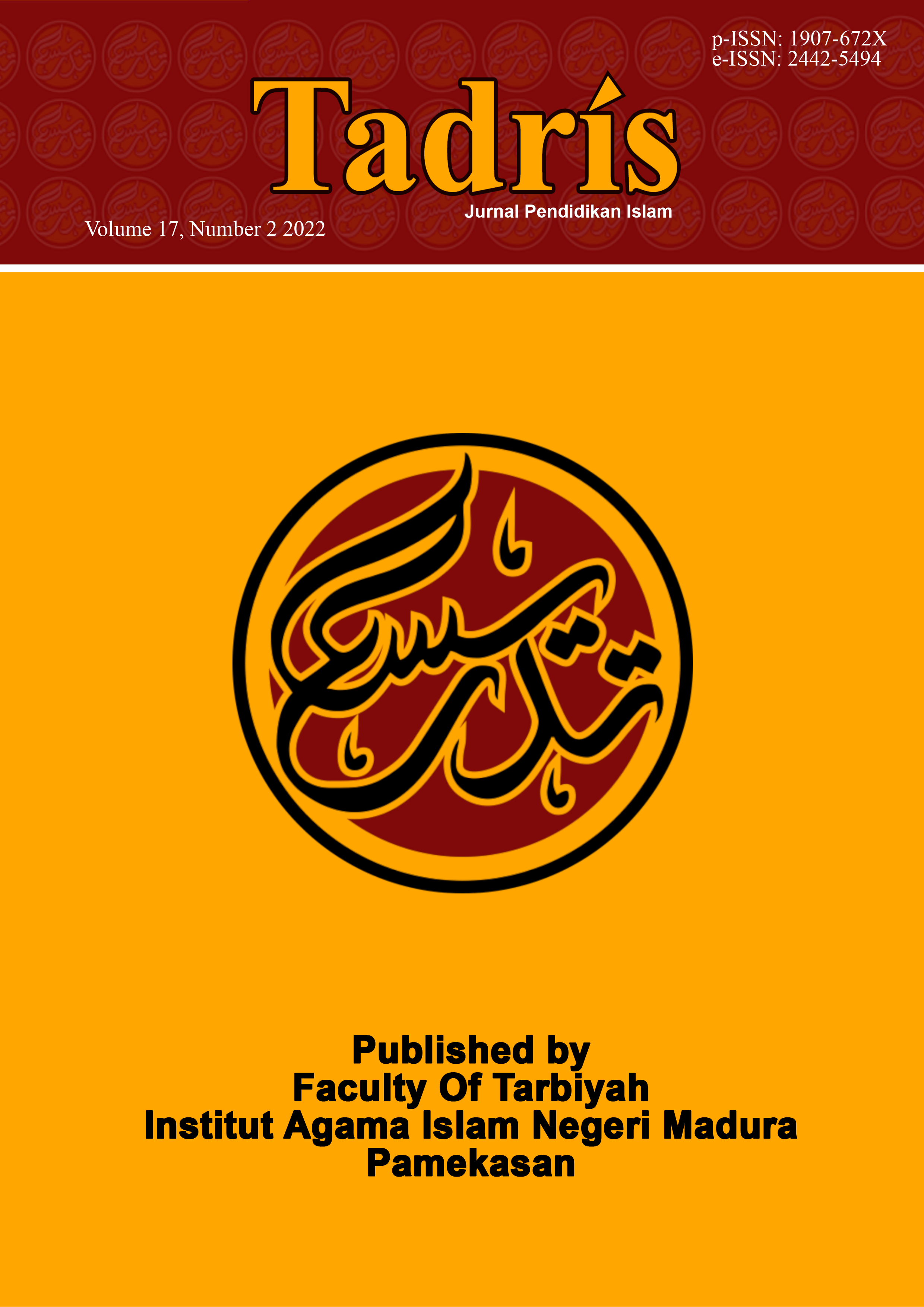Local Wisdom Bâburughân Beccè' in Madurese Proverb to Maintain Local Content Learning in Islamic Boarding School
 Abstract views: 370
,
Abstract views: 370
,
 PDF downloads: 215
PDF downloads: 215
Abstract
Madurese proverb is one of the traditional expression of Madurese ethnic which contains various bâburughân beccè' or advice which contains values. One of the highest values held by the Madurese community is religious values which are based on the strength of belief in Islam. The expression that still remains a strength in maintaining Madurese local wisdom is the existence of the application of religious values contained in Madurese proverb. The identity of the attitude of the Madurese community is embedded in traditional expressions, namely in proverbs that become advice in every mindset and philosophical attitude of the Madurese community. The purpose of this study is to describe the form of bâburughân beccè' in Madurese proverbs in order to maintain Madurese local wisdom in social reality in Islamic boarding schools. This study uses a qualitative approach with a phenomenological type of research. Sources of data in this study consisted of kyai, lora, and students in one Islamic boarding school in Pamekasan Regency. The results showed that there was a form of bâburughân beccè' or advice in Madurese proverbs which were expressed in the form of religious values, character education, and socio-cultural values. So it can be said that nature, objects, and the surrounding environment shape the attitude and character of the religious Madurese community.
Downloads
References
Abubakar, and Anwar. “Analisis Karakter Dan Kearifan Lokal Dalam Pembelajaran Sosiologi Di Kota Banda Aceh.” Jurnal Komunitas 5, no. 2 (September 18, 2013): 287–95. https://doi.org/10.15294/KOMUNITAS.V5I2.2758.
Al Quran Surah Al-’Asr Ayat 1-3. Kemenag RI, n.d.
Atika, M. “PENGUATAN PERAN LANGGAR SEBAGAI MEDIUM KELUARGA DALAM UPAYA PEMBENTUKAN PENDIDIKAN KARAKTER ANAK DI MADURA.” Personifikasi 10, no. 2 (2019): 141–57.
Danandjaya, James. Folklor Indonesia: Ilmu Gosip, Dongeng, Dan Lain-Lain. Jakarta: Pustaka Utama Grafiti, 1991.
Effendy, MH. “Local Wisdom Dalam Tembang Macapat Madura.” OKARA: Jurnal Bahasa Dan Sastra 9, no. 1 (2015). http://ejournal.iainmadura.ac.id/okara/article/download/580/562.
Hani’ah, Sahid Teguh Widodo, Sarwiji Suwandi, and Kundhru Saddhono. “Membangun Moralitas Generasi Muda Dengan Pendidikan Kearifan Budaya Madura Dalam Parebasan.” In The 1st Education and Language International Conference Proceedings Center for International Language Development of Unissula, 2017.
Harahap, Siti Rahma. “Proses Interaksi Sosial Di Tengah Pandemi Virus Covid 19.” AL-HIKMAH: Media Dakwah, Komunikasi, Sosial Dan Budaya 11, no. 1 (June 29, 2020): 45–53. https://doi.org/10.32505/HIKMAH.V11I1.1837.
Haryanto, Joko Tri. “Kearifan Lokal Pendukung Kerukunan Beragama Pada Komuntias Tengger Malang Jatim.” Analisa: Journal of Social Science and Religion 21, no. 2 (December 30, 2014): 201–13. https://doi.org/10.18784/ANALISA.V21I02.15.
Haryono, A, and A Sofyan. “PENGGUNAAN BAHASA DAN GAYA BAHASA SEBAGAI BENTUK KEARIFAN LOKAL MADURA YANG BERFUNGSI SEBAGAI RESOLUSI KONFLIK (Language,” 2020.
Hiadayat. “Wawancara Langsung Bersama Ustaz Hidayat,” 2022.
Ikhwan, Wahid Khoirul. “NILAI KEARIFAN LOKAL YANG TERKANDUNG DALAM LAYANG JATISWARA PADA UPACARA NYADAR KETIGA DESA PAPAS SUMENEP.” Pamator Journal 8, no. 1 (April 17, 2015): 19–34. https://doi.org/10.21107/pamator.v8i1.2076.
Kosim, Mohammad. “URGENSI PENDIDIKAN KARAKTER.” Karsa: Journal of Social and Islamic Culture, 2011, 84–92. https://doi.org/10.19105/KARSA.V19I1.78.
Maimun, and Abdul Haris. “Civic Education Pesantren Salaf Di Madura : Sinergi Pendidikan Karakter Dan Upaya Deradikalisasi.” TADRIS: Jurnal Pendidikan Islam 16, no. 2 (December 22, 2021): 411–24. https://doi.org/10.19105/TJPI.V16I2.5137.
Miles, M.B., and A.M. Huberman. Analisis Data Kualitatif. Jakarta: Universitas Indonesia, 2018.
Nugraha, A. P. “Makna Peribahasa Madura Dan Stereotip Kekerasan Pada Etnis Madura (Tinjauan Stilistika).” Lingua 12, no. 2 (2017).
Philipus, and Nurul Aini. Sosiologi Dan Politik. Jakarta: PT. RajaGrafindo Persada, 2011.
Pingge, Heronimus Delu. “KEARIFAN LOKAL DAN PENERAPANNYA DI SEKOLAH.” Jurnal Edukasi Sumba (JES) 1, no. 2 (October 1, 2017): 128–35. https://doi.org/10.53395/JES.V1I2.27.
Putikadyanto, Agus Purnomo Ahmad, Iswah Adriana, and Agik Nur Efendi. “Presentation Culture in the Digital Age: Online Identity Representation on Social Media.” Proceedings of the International Congress of Indonesian Linguistics Society (KIMLI 2021) 622 (December 27, 2021): 45–49. https://doi.org/10.2991/ASSEHR.K.211226.011.
Putikadyanto, Agus Purnomo Ahmad, and Nur Aisyah Sefrianah. “Kegiatan Keagamaan Dan Pamali Hari Kamis Berjualan Di Kabupaten Pasuruan.” Religious: Jurnal Studi Agama-Agama Dan Lintas Budaya 4, no. 1 (2019): 1–11. https://doi.org/10.15575/RJSALB.V4I1.7605.
Rifai, Mien Ahmad. Manusia Madura. Yogyakarta: Pilar Media, 2007.
Sadik, A. Sulaiman. Jati Diri, Budaya Lokal Dan Kearifan Lokal Madura. Surabaya: CV. Karunia, 2013.
Subhan, Moh., and Ahmad. “Manajemen Pembelajaran Di Pesantren Miftahul Ulum Bettet Pamekasan Pada Masa Pandemi Covid-19.” TADRIS: Jurnal Pendidikan Islam 16, no. 2 (November 28, 2021): 257–70. https://doi.org/10.19105/TJPI.V16I2.5362.
Sutomo, I. “Modification of Character Education into Akhlaq Education for the Global Community Life.” Indonesian Journal of Islam and Muslim Societies 4, no. 2 (2014): 291–316.
Wikantiyoso, Respati. Kearifan Lokal: Dalam Perencanaan Dan Perancangan Kota Untuk Mewujudkan Arsitektur Kota Yang Berkelanjutan. Malang: Grup Konservasi Arsitektur dan Kota, 2009.
Copyright (c) 2022 TADRIS: Jurnal Pendidikan Islam

This work is licensed under a Creative Commons Attribution-NonCommercial 4.0 International License.
The journal operates an Open Access policy under a Creative Commons Non-Commercial 4.0 International license. Authors who publish with this journal agree to the following terms:
- Authors retain copyright and grant the journal right of first publication with the work simultaneously licensed under a
 Commons Attribution-NonCommercial 4.0 International License
Commons Attribution-NonCommercial 4.0 International Licensethat allows others to share — copy and redistribute the material in any medium or format, and adapt — remix, transform, and build upon the material.
- Authors are able to enter into separate, additional contractual arrangements for the non-exclusive distribution of the journal's published version of the work (e.g., post it to an institutional repository or publish it in a book), with an acknowledgement of its initial publication in this journal.
- Authors are permitted and encouraged to post their work online (e.g., in institutional repositories or on their website) prior to and during the submission process, as it can lead to productive exchanges, as well as earlier and greater citation of published work (see The Effect of Open Access).














